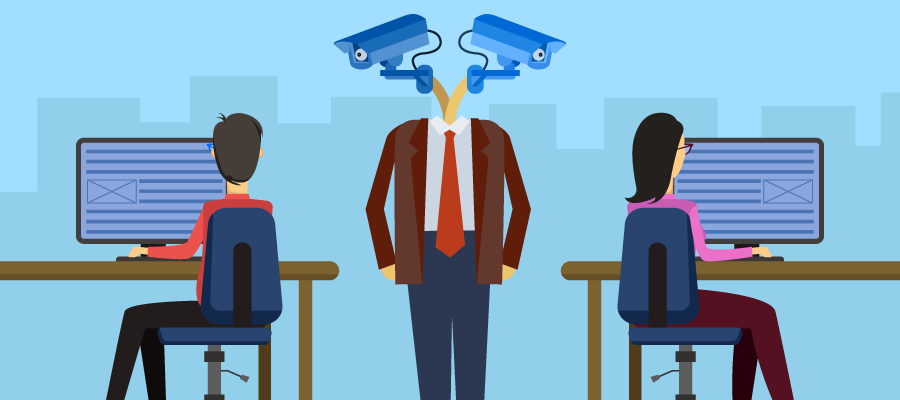Employee Tracking Software and the Law: What Are the Limits in 2024

The UK is getting ready for another line of lockdown restrictions, leaving millions of people to continue working from their home offices. When the lockdown first started, many managers faced remote team management for the first time, and since it wasn’t as easy as they expected – they’ve turned to employee tracking software for help, according to workpuls.com. The industry boomed, and there are now thousands of companies using different solutions of this kind.
But, is employee monitoring legal in the United Kingdom, and to what extent? How does it affect the employees, and what can you do to keep your employees happy? Continue reading if you want to know more about the process, how you can benefit from it, how it will improve the skills of your employees, and where you should draw the line.
Data Protection Act of 2018

The Data Protection Act 2018 (DPA) is the UK’s version of the General Data Protection Regulation, which was implemented in the European Union. It doesn’t prevent employers from monitoring, but you should keep in mind that employees are entitled to some privacy at work.
You, as an employer, must make sure that everyone on your team is notified about monitoring and your reasons behind implementing these procedures.
Start with an employee monitoring policy or a procedure, which describes in detail what type of employee tracking software you’re using, who will you be monitoring, and why; as well as who will have access to the collected data. The monitoring can’t be excessive and must be justified, meaning you need to have a good reason for it.

Additionally, under DPA you’re required to notify employees of how long you’ll keep the data you’re collecting. This data must be kept secure, and you must be able to show it to the employees upon their request (although we do recommend that you give employees access to their own data at all times).
Note that you should always talk to your workers about the new system that is going to be implemented before you do it. You also should let them know about the whole process, and give them enough details on what it is going to happen with the collected data, and how it is going to affect them.
In rare cases, you might need to monitor employees in secret (as a part of an internal investigation), and in this case, you need to have a legitimate reason to use the monitoring software, such as possible criminal activity or malpractice. The monitoring data connected to the investigation should be collected as quickly as possible, only used for this specific purpose, and the monitoring must stop once the investigation is completed.
How Do Employees Feel About Tracking?

Once they learn that their computer activities will be tracked, most employees feel uncomfortable. Put yourself in their shoes, nobody likes to be monitored. This is why you need to take time to give detailed information about monitoring to everyone in your company. Additionally, you should lay out the benefits it will bring to them.
Most workers believe that monitoring exclusively benefits the management, so you must make sure they understand you’re not the only one getting the goods out of this. First of all, none of their work will go unnoticed. Their managers will be able to see how much time they’re spending on each task, and they’ll easily determine what they’re good at. It’s also better with workload organization since nobody will be swamped with tasks while the other team members get to chill.
Give your team enough time to adjust to the process, and always be there for them if they have any questions. Most people nowadays are already informed about these trackers, and they know the basics of what is going to happen. However, since every software is different, they may need more information from you about what the changes are going to be, what will happen, and how they can keep their personal data intact.

Additionally, in the case of hourly workers and overtime hours – those won’t go unnoticed as well. Due to simple mistakes in the calculation of hours, employees could end up being paid less than they should; and then the process of complaints begins. This is something all of you can forget about if you’re using an employee tracking software.
Employees’ productivity will increase, which will help them get promoted and advance their careers faster. Note that when you sit down to talk with them, you should start with the positive things that are going to happen, and that will affect their skills, as well as their paychecks. Steer away from using strong words, and try to give them enough time to learn more about the software at hand, and how they are going to benefit from it. Make a plan about all the things you want to tell them, and if needed, contact people who’ve already implemented this change, and learn how to avoid any possible mistakes.
Wrap Up
To answer those questions, we posed at the beginning of the article: yes, employee monitoring is legal in the UK, but you need to follow the Data Protection Act 2018. Employees might feel uneasy with the software in the beginning, but presenting them with the benefits will definitely help you get their buy-in.
By implementing this type of software, you will be able to increase the productivity of your team, and you will also be able to monitor everything that is going on in your company. The transparency will be on an increased level, and every issue will be tackled right away.
Note that you need to choose the right type of software for your company, and nowadays there are a lot of different types that offer you functions depending on your line of business and specific needs. If you are not sure what you should get, and if it is legal, you can always talk to the sellers, and see what they offer and recommend. Most of the products are available with a free trial, so you can test the software out with a few members of your team, see if you are getting the data you need, and if it is something that works for you, you can, later on, purchase it for the whole company, or separate departments.




